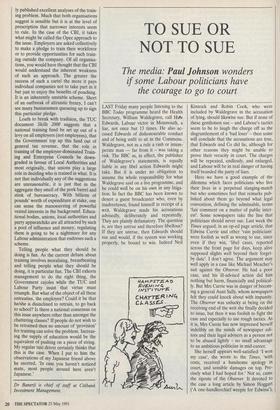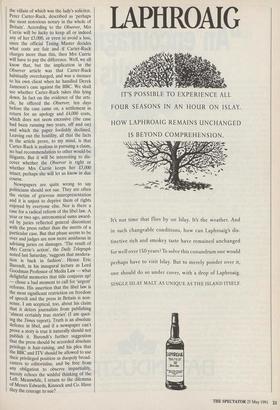TO SUE OR NOT TO SUE
if some Labour politicians have the courage to go to court
LAST Friday many people listening to the BBC Today programme heard the Health Secretary, William Waldegrave, call Hutv Edwards, Labour victor in Monmouth, a liar, not once but 13 times. He also ac- cused Edwards of dishonourable conduct and of being unfit to sit in the Commons. Waldegrave, not as a rule a rash or intem- perate man — far from it - was taking a risk. The BBC as, in effect, the publisher of Waldegrave's statements, is equally liable in any libel action Edwards might take. But it is under no obligation to assume the whole responsibility for what Waldegrave said on a live programme, and he could well be on his own in any litiga- tion. In fact the BBC has been known to desert a guest broadcaster who, even by inadvertence, found himself in receipt of a writ. Waldegrave made his accusations advisedly, deliberately and repeatedly. They are plainly defamatory. The question is, are they untrue and therefore libellous? If they are untrue, then Edwards should sue and would, if the system was working properly, be bound to win. Indeed Neil Kinnock and Robin Cook, who were included by Waldegrave in the accusation of lying, should likewise sue. But if none of these gentlemen sue — and Labour's tactics seem to be to laugh the charge off as the disgruntlement of a 'bad loser' - then some will conclude that the accusations are true, that Edwards and Co did lie, although for other reasons they might be unable to prove their veracity in court. The charges will be repeated, endlessly, and enlarged, and Labour will be in real danger of having itself branded the party of liars.
Here we have a good example of the dilemma which faces politicians who live their lives in a perpetual slanging-match but who sometimes feel that remarks pub- lished about them go beyond what legal convention, defining the admissable, terms `fair comment on a matter of public inter- est'. Some newspapers take the line that politicians should never sue. Last week the Times argued, in an op-ed page article, that Edwina Currie and other 'vain politicians' were foolish as well as wrong to sue, since even if they win, 'libel cases, reported across the front page for days, keep alive supposed slights well beyond their forget- by date'. I don't agree. The argument may well apply in a case like Michael Meacher's suit against the Observer. He had a poor case, and his ill-advised action did him nothing but harm, financially and political- ly. But Mrs Currie was in danger of becom- ing a general Aunt Sally, whom newspapers felt they could knock about with impunity. The Observer was unlucky at being on the receiving end of the writ she finally decided to issue, but then it was foolish to fight the case and especially to use rough tactics. As it is, Mrs Currie has now impressed herself indelibly on the minds of newspaper edi- tors and their legal advisers as a person not to be abused lightly - no small advantage to an ambitious politician in mid-career.
She herself appears well-satisfied: `I won my case', she wrote to the Times, 'with costs, received a handsome apology in court, and sensible damages on top. Pre- cisely what I had hoped for.' Not so, came the riposte of the Observer. It devoted to the case a long article by Simon Hoggart CA one-handkerchief weepie for Edwina'), the villain of which was the lady's solicitor, Peter Carter-Ruck, described as 'perhaps the most notorious notary in the whole of Britain'. According to the Observer, Mrs Currie will be lucky to keep all or indeed any of her £5,000, or even to avoid a loss, since the official Taxing Master decides what costs are fair and if Carter-Ruck charges more than this, then Mrs Currie will have to pay the difference. Well, we all know that, but the implication in the Observer article was that Carter-Ruck habitually overcharged, and was a menace to his own client when he handled Derek Jameson's case against the BBC. We shall see whether Carter-Ruck takes this lying down. In fact on the evidence of the arti- cle, he offered the Observer, ten days before the case came on, a settlement in return for an apology and £4,000 costs, which does not seem excessive (the case had been running two years, off and on) and which the paper foolishly declined. Leaving out the hostility, all that the facts in the article prove, to my mind, is that Carter-Ruck is zealous in pursuing a claim, no bad recommendation to other would-be litigants. But it will be interesting to dis- cover whether the Observer is right or whether Mrs Currie keeps her £5,000 Intact; perhaps she will let us know in due course.
Newspapers are quite wrong to say politicians should not sue. They are often the victim of grievous misrepresentation and it is unjust to deprive them of rights enjoyed by everyone else. Nor is there a case for a radical reform of the libel law. A year or two ago, astronomical sums award- ed by juries reflected general discontent with the press rather than the merits of a particular case. But that phase seems to be over and judges are now more assiduous in advising juries on damages. 'The result of Mrs Currie's action', the Daily Telegraph noted last Saturday, 'suggests that modera- tion is back in fashion'. Hence Eric Barendt, in his inaugural lecture as Lord Goodman Professor of Media Law — what delightful memories that title conjures up! — chose a bad moment to call for 'urgent' reforms. His assertion that the libel law is the most significant restriction on freedom of speech and the press in Britain is non- sense. I am sceptical, too, about his claim that it deters journalists from publishing almost certainly true stories' (I am quot- ing the Times report). Truth is an absolute defence in libel, and if a newspaper can't Prove a story is true it naturally should not publish it. Barendt's further suggestion that the press should be accorded absolute Privilege is hair-raising, and his plea that • the BBC and ITV should be allowed to use their privileged position as duopoly broad- casters to editorialise, and be free from any obligation to observe impartiality, merely echoes the wishful thinking of the Left. Meanwhile, I return to the dilemma of Messrs Edwards, Kinnock and Co. Have they the courage to sue?



















































 Previous page
Previous page